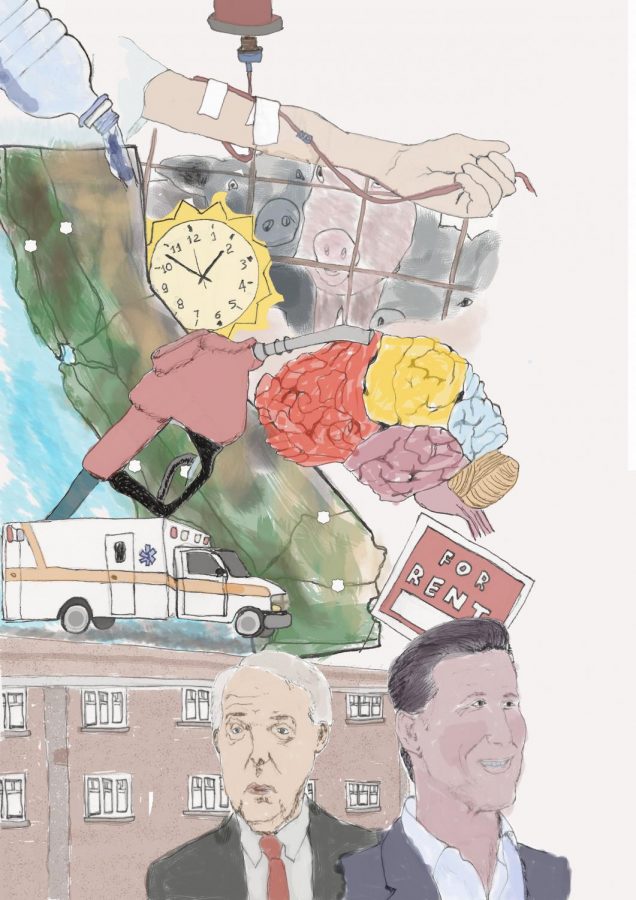Election offers hope for the Golden State
Oct 24, 2018
On Nov. 6, Californians will have their chance to add their voices to the nation’s democratic process as they cast their ballot in the 2018 California General Election.
With what’s been a tumultuous political climate since the election of President Donald Trump in 2016, and California and its leaders at odds with his administration ever since, the stakes are high and seem detrimental to the continued progress of liberal-leaning California.
To help Contra Costa College students gain a better understanding of local, regional and state issues that are at stake in this election, The Advocate explores the 11 state propositions, including Proposition 10, which expands local governments’ authority to enact rent control on residential property. Also examined is Proposition 12, which establishes new standards for the confinement of specified farm animals and bans the sale of related non-complying products, and Proposition 6, which would repeal the state’s gas tax that was approved in 2017.
A variety of local measures are also on the ballot, including Measure R, which would authorize Contra Costa County to tax commercial marijuana businesses in unincorporated areas.
Voters also have the power to determine who will take on leadership roles, not only at the various local levels, but at the state level as well.
Articles, graphics, artwork and photos in this section also dive into the campaigns of local and state candidates vying for a seat.
The biggest contest is for governor of California, which pits Democratic heavyweight Gavin Newsom against Republican outsider John Cox.
Newsom, who has served as California’s lieutenant governor since 2010, maintains a steady lead at 50 percent of probable voters, according to a KFI-NBC poll conducted on Oct. 16. Cox, a businessman from San Diego, has struggled since hitting the campaign and trails in that poll at 43 percent.
During this year’s gubernatorial campaign, a variety of issues facing California were dragged into the spotlight.
These issues include healthcare, affordable housing, homelessness and the environment.
Cox and Newsom have conflicting views on many of these issues, including the hot button topic of the moment — immigration.
While Cox seems to be more in line with the Trump Administration’s border wall and opposition to sanctuary cities, Newsom is steadfast on his platform of keeping the families of those who cross the border together.
Aside from the race for California governor, a race for U.S. Senate finds Democratic mainstay Dianne Feinstein against Democratic newcomer Kevin De Leon.
Feinstein, who has been a U.S. senator since 1992, leads De Leon 41 to 28 percent, according to an Oct. 14 poll by KABC.
Other noted state election races include secretary of state, attorney general and lieutenant governor.
The Advocate has also provided a short bio of local candidates campaigning for a vote on election Tuesday.
Richmond residents will have the chance to choose three candidates to serve four-year terms on its city council and will select either challenger Melvin Willis or incumbent Tom Butt as mayor.
San Pablo residents will also have the chance to decide on two city council seats among three candidates.
A hotly contested state Assembly race includes Democratic newcomers Buffy Wicks and Jovanka Beckles, who are vying for Tony Thurmond’s seat for District 15, which encompasses the bayside East Bay. Democrat Thurmond has termed out.
Incumbent Democrat Jim Frazier and Republican challenger Lisa Romero are competing for the Assembly District 11 seat (East Contra Costa and Southern Solano County), while Jerry McNerney and Marla Livengood battle for the House of Representatives seat for District 9.
For those planning to vote on Election Day, Nov. 6, polling stations are open from 7 a.m. to 8 p.m. As long as voters are in line by 8 p.m., they will be able to cast their vote and have it counted.
Each county has its own polling stations and for those who are unsure of where their polling place is located, call the California secretary of state’s toll-free voter hotline at 800-345-VOTE (8683).
First-time voters may be required to bring identification and anyone registered to vote in the state of California can vote early in person.


